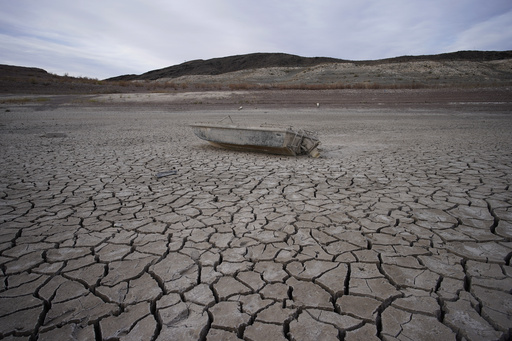
LAS VEGAS — On Wednesday, federal water authorities unveiled what they referred to as “necessary steps” intended for seven states and several tribes reliant on Colorado River water and hydropower. This initiative seeks to establish guidelines by the August 2026 deadline for future management of the critical waterway.
Commissioner Camille Calimlim Touton from the Bureau of Reclamation highlighted the collaboration among involved parties as she presented four actionable proposals along with one “no action” option that will be available to the future incoming administration. With formal environmental assessments yet to be conducted, urgency grows as stakeholders face only 20 months to reach an agreement.
The announcement did not make any recommendations or determinations on how to allocate water from the river, vital for providing electricity to millions and irrigation for extensive desert farmlands. It also serves as a source for municipal water in major cities like Denver, Salt Lake City, Albuquerque, Las Vegas, Phoenix, and Los Angeles.
Instead of solutions, the announcement summarized competing proposals submitted last March by three main stakeholder groups: the Upper Basin, encompassing Colorado, Utah, New Mexico, and Wyoming; the Lower Basin, which consists of California, Arizona, and Nevada; and over two dozen Native American tribes with entitlements to river water.
According to Sarah Porter, the director of the Kyl Center for Water Policy at Arizona State University, the federal government has not chosen any specific proposals but rather assembled components to encourage dialogue and negotiations going forward.
One proposed alternative involves government efforts to safeguard essential infrastructure, including dams, while managing river water distribution in alignment with existing agreements when demands exceed available supply. However, this approach would not introduce new delivery and storage solutions.
A second alternative suggests enhancing delivery and storage capabilities for Lakes Powell and Mead, along with both federal and non-federal storage options to support sustainability and flexibility in water distribution during shortages.
A third option, labeled “cooperative conservation,” stems from advocate proposals focused on managing water release from Lake Powell while promoting contributions towards overall system integrity.
The fourth hybrid proposal amalgamates aspects of plans from both Upper and Lower Basin states, as well as Tribal Nations, aiming at improving water delivery and storage for Lakes Powell and Mead, alongside encouraging conservation measures and agreements on water use among different entities.
The “no action” alternative, while included because of legal requirements under the National Environmental Policy Act, does not fulfill the objectives of the study.
In 2026, the legal agreements that currently govern the river’s allocations will conclude, compelling stakeholders and federal authorities to come to a consensus in the face of climate change repercussions and over two decades of drought.
Tom Buschatzke, Arizona’s lead negotiator concerning the river, acknowledged the significant divide between Upper and Lower Basin states’ positions during a recent conference call with journalists. He highlighted the evolving dynamics of tribal water rights, particularly from communities like the Gila River Indian Community in Arizona.
While Buschatzke expressed some optimism regarding the proposals, he indicated that he needed more time to analyze them comprehensively and affirmed that prompt progress would be beneficial.
U.S. Senator John Hickenlooper, a Democrat from Colorado, emphasized the critical nature of the situation involving the Colorado River, stating that collaboration across the seven states is essential to resolve the crisis without resorting to legal battles. He warned that failing to find common ground could lead to dire consequences for the river.
The recent announcement comes on the heels of Vice President Kamala Harris’s election defeat to former President Donald Trump and precedes an important meeting for the involved stakeholders at the Colorado River Water Users Association conference in Las Vegas.
Kyle Roerink, executive director of the Great Basin Water Network, remarked that the snapshots provided during the announcement illustrate the uncertainties surrounding future river governance as a new administration is poised to enter office.
Roerink called for basin-wide reductions, assurances for tribal water rights, a pause on new dams and diversions, as well as commitments to protect endangered species and reconsider outdated infrastructure.
Although Buschatzke refrained from speculating on whether the Trump administration would continue initiatives set forth by Biden’s team, Porter noted the expectation of continuity, emphasizing that many individuals involved in the extensive negotiations and modeling have been active for a significant duration and will likely remain engaged in the process.
